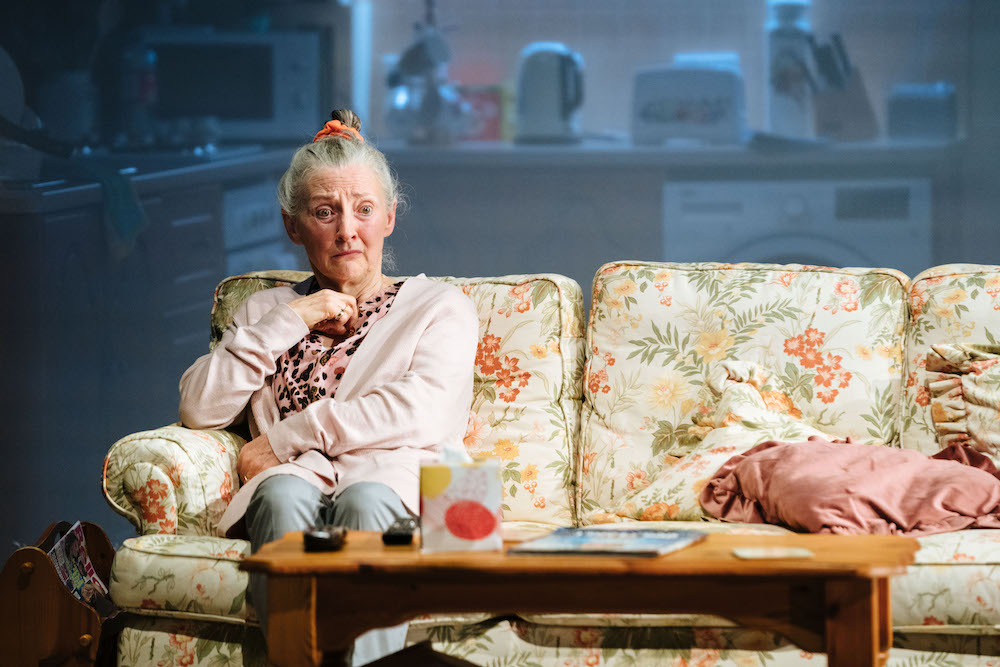Men are bastards. Okay, not all of us, but enough to make the lives of millions of women a misery. This we know, but anyone who has any doubts might be educated by some of the horrific statistics of sexual assault and domestic violence in the programme of Deborah Bruce’s Dixon and Daughters, a new play at the Dorfman space of the National Theatre. It is produced by Clean Break, which works with women who’ve experienced the criminal justice system, so it has its own agenda about women and criminalisation. But for a drama to be worth seeing it surely needs to go beyond a programme and an agenda, so how does this play work?
It is set in the Bradford home of Mary, 64-year-old widow of Ray Dixon, and shows what happens when she returns from prison. Welcoming her back are her 40-something daughters Bernie and Julie, plus Bernie’s student daughter Ella. Mary was sentenced to six months for colluding with her husband’s sexual abuse of his oldest daughter Briana, now 46 years old. She has testified against her step-mother Mary in court so her arrival is unwelcome, as is her mission to expose all of the family’s secrets. But Mary doesn’t want to know, and instead introduces an unexpected guest, Leigh, who she met in prison and is now living on the streets.
This is a story about trauma, and each of the women – with the exception of Bernie – have some experience of abuse or harassment. Bruce avoids marking them all out as victims, by showing how Briana has changed both her name (from Tina, a running joke) and turned her life around as a survivor of trauma. She has overcome addiction issues, and tries to help her half-sister Julie, who has just left her abusive man, with her drinking problems. It is scarcely a spoiler to say that Mary has also suffered in her marriage to Dixon, or that Leigh’s experiences have been horrendous.
 While everyone can agree that this play raises important issues about family life, highlighting the complicity of women with abusive men, and the way that strict silence covers terrible childhood and adult experiences, the challenge is to make this horrible story theatrically effective. The National is not usually a platform for campaigning or consciousness-raising plays and Dixon and Daughters sometimes feels as if it’s not really in the right venue. The other challenge is to turn trauma into worthy theatre that is more than a misery fest, in other words into entertainment.
While everyone can agree that this play raises important issues about family life, highlighting the complicity of women with abusive men, and the way that strict silence covers terrible childhood and adult experiences, the challenge is to make this horrible story theatrically effective. The National is not usually a platform for campaigning or consciousness-raising plays and Dixon and Daughters sometimes feels as if it’s not really in the right venue. The other challenge is to turn trauma into worthy theatre that is more than a misery fest, in other words into entertainment.
Bruce and her director, Róisín McBrinn – artistic director of Dublin’s Gate Theatre – include a fair bit of comedy as a contrast to the play’s serious themes. For example, Mary complains that Julie has slept in her room so she won’t be able to rest because the bed’s memory foam retains the shape of Julie’s body. There are several similarly quirky moments, from jokes about Dixon’s dick to Leigh’s vulgarities, in an otherwise emotionally fraught evening. Less successful is the decision to add a haunted house theme, the idea that violent events are imprinted into the fabric of the building, affecting its atmosphere and its vibe. At times, this is so exaggerated with loud sound and lighting effects that its comes across almost as a distracting parody of horror films.
Central to the play is the powerful idea that there is no hierarchy of bad male behaviour: Bruce argues implicitly that every form of abuse, from unwanted attentions and touching to abduction and rape, are equally intolerable, and should always be called out. While women’s silence often allows men to get away with harassment and abuse, it is female solidarity that offers a way of change. Bruce’s creation of the character of the truth-telling Briana, an explosive human “firework” who is both strikingly comical and a symbol of redemption and forgiveness, is itself an illustration of these themes.
Although the mixture of comedy and darkness doesn’t always work, Dixon and Daughters has several extremely moving moments, and both production and cast gradually create a sense of compassionate engagement with the victims of harassment and abuse: Brid Brennan’s sour matriarch Mary (pictured above) and Alison Fitzjohn’s wonderful Briana have a strong stage presence, and Posy Sterling gives the damaged but humorous Leigh a convincing edginess. Liz White (Bernie), Andrea Lowe (Julie) and Yazmin Kayani (Ella) likewise make an effective contribution. If some of McBrinn’s stage pictures are a bit static, Kat Heath’s set exudes the required claustrophobia, and no one can doubt the integrity of this 90-minute play. It is both a truthful and authentic account of comfortless themes.















Add comment